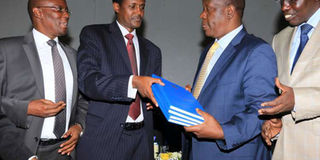Revealed: How teachers steal school money

Ethics and Anti-Corruption Commission Chief Executive Halakhe Waqo (second left) hands over a report on the use of free primary education funds to Education Cabinet Secretary Fred Matiang’i at the Kenya Institute of Curriculum Development on May 25, 2016. Looking on are EACC Commissioner Paul Gachoka (left) and Education Principal Secretary Belio Kipsang (right). PHOTO | JEFF ANGOTE | NATION MEDIA GROUP
What you need to know:
The government releases Sh1,420 for each pupil in primary schools every year.
The report shows that some school heads loan themselves as much as Sh100,000, which they often don’t pay.
The money is also loaned to parents especially those sitting on management committees.
Mr Waqo said the penalties meted out on teachers found to have misappropriated funds or stolen books was too light since they were either demoted or transferred.
Headteachers and school boards are misusing free primary education cash on overseas trips, sitting allowances and other irregular activities, an investigation report reveals.
They also exaggerate enrolment records to attract more money, which they then divert to their personal needs, says the report by the Ethics and Anti-Corruption Commission (EACC).
The government releases Sh1,420 for each primary school pupil every year.
The report, presented to Education Cabinet Secretary Fred Matiang’i on Wednesday, also shows that some school heads loan themselves as much as Sh100,000, which they often don’t pay.
The money is also loaned to parents, especially those sitting on management committees.
In one school in Nakuru County, a headteacher misled the chairman to sign a cheque for Sh3,000 but he later altered it to read Sh30,000 and cashed it.
Dr Matiang’i said the government would from next year unveil a new system that will capture details on enrolment and disbursement.
“Parents will be able to check on how much has been allocated to their school every year,” he said, adding that the government had not been able to audit more than 30 per cent of resources allocated to schools yearly.
The report, titled Examination into the Systems, Policies, Procedures and Practices Used in the Disbursement and Utilisation of Free Primary Education (FPE) Funds, was handed over to Dr Matiang'i by EACC Chief Executive Officer Halakhe Waqo at the Kenya Institute of Curriculum Development.
It revealed that some headteachers withdrew large amounts of money from school accounts and kept it in their offices even when there was no immediate need for cash payments.
“In most cases, the security of the school was inadequate and schools did not have cash safes to securely store the cash withdrawn. This is an opportunity for embezzlement and loss of the funds,” says the report, which also reveals massive irregularities in the procurement of textbooks for public schools.
The fraud ranges from forging signatures, delivering “ghost” books, overpricing and single sourcing of suppliers by Instructional Materials Selection Committees, says the report, which also blames the Teachers Service Commission for failing to take appropriate action against the culprits.
Mr Waqo said the penalties meted out on teachers found to have misappropriated funds or stolen books was too light since they were either demoted or transferred.
“It is not sufficient to transfer teachers culpable of theft of funds, books and other materials to other schools,” said Mr Waqo, warning that the commission would go after those involved.
“The system adopted by TSC to recruit primary school teachers and for the ministry to recruit zonal inspectors of schools within their home localities must be revisited and reviewed as it is a major loophole for collusion even in the selection of the school committees,” he said.
SYSTEM FAILURE
Dr Matiang’i said more than Sh100 billion had been pumped into primary schools since the introduction of free primary education while secondary schools had received Sh200 billion.
He said the government would reconstitute school audit units because the current system had failed and that a five-member team from the Education ministry would work with the EACC to have the report’s recommendations implemented.
“We will also train school heads [properly] on how to use resources allocated to them,” said Dr Matiang’i.
Other irregularities noted include overpayment for goods and services, illegal tendering, conflict of interest, flouting of disbursement procedures, deliberate exclusion of school management committees in the use of the funds, failure to act on audit reports and fraudulent acquisition and disposal of public property.
Mr Waqo said that in many schools, particularly where books are procured on credit, headteachers tended to order books in unnecessarily big numbers, creating an opportunity for retailers to move dead stock.
Most schools lack critical materials such as atlases despite the huge investment by the government, he said.
“EACC strongly suggests that the ministry reconsiders reverting to the pooled procurement and distribution of learning materials to schools, which was also recommended by committee members and headteachers in some of the schools visited during the investigations,” said Mr Waqo.
He added that the audit system for primary schools was a failure since auditors rarely visited schools.
“The FPE funds for most schools visited had been audited yet these practices were not detected. Some school principals claimed that they had been robbed and all documents stolen as they were taking them for audit,” said Mr Waqo.
He urged the ministry to adopt the recommendations with an emphasis on supervision to ensure discipline in the management of funds.
The report also notes that most schools do not display on notice boards information on the amounts of funds received or the intended use of the money, as the rules demand.





